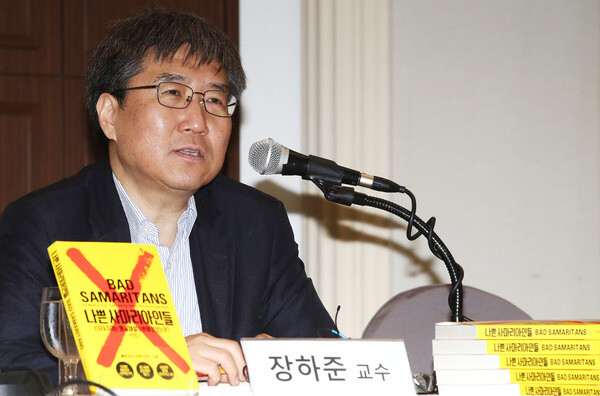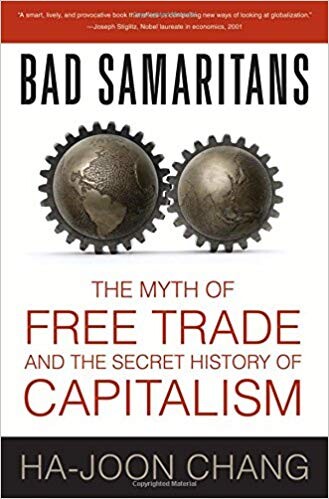hankyoreh
Links to other country sites 다른 나라 사이트 링크
Professor and author of “Bad Samaritans” names neoliberalist policies as cause of economic strife

“Since the 1980s, indiscriminate neoliberalism and unfettered neoliberalism have made the global economy worse. Scores are lower than the 1960s and 1970s for all economic indicators. Even though developing countries have liberalized finance and opened their markets as the rich countries told them to do, their economies have gotten worse and made dependent. Why is that the case? That’s the reason I wrote this book.”
On July 17, Cambridge University economics professor Ha-joon Chang held a press conference at the Press Center in Seoul to mark the publication of a special 10th anniversary edition of his steady seller Bad Samaritans: The Myth of Free Trade and the Secret History of Capitalism. Originally published in English, the book was translated into Korean for its first publication in South Korea in 2007 by the publisher Bookie. The next year, South Korea’s Defense Ministry designated it a “subversive book” that attacked the government with its anti-American and anti-capitalist arguments.

“South Korea was another victim of neoliberalism and liberalization. The rapid financial liberalization since the 1990s led to a rapid decline in the economic growth rate and facility investment, investment uncertainty and stagnant welfare spending,” Chang said.
“While I didn’t write this book with Korea in mind, a lot of its points are still valid, such as the sections on opening markets and liberalizing financial markets. The Korean economy is currently in a major crisis. If I find myself saying something similar ten years from now, Korea’s prospects for the future will truly be dark,” Chang said, emphasizing the urgency of fundamental reforms to the economic structure.
Chang also said that the controversy and conflict over shortening the work week to 52 hours and raising the minimum wage – which have lately been the biggest topics in economic policy – were caused “not simply by the chaebols’ monopoly and capitalists’ greed but by the economic and social structure. The issue of concentrated wealth needs to be solved not through corporate policy but through tax and welfare policy.”
“Because of the fundamental weakness of social policy in South Korea, it’s common for people who lose their job to start their own business because they have no other way to support themselves. The percentage of self-employed here is more than 25 percent, compared to the 12 percent you see in wealthy countries. The self-employed here are people who wouldn’t become capitalist entrepreneurs in other countries but do so [to make a living] in South Korea. Considering that they’re effectively exploiting themselves, raising the minimum wage only makes their burden heavier,” Jang said.
“Since the problem is that micro businesses and the self-employed have been tasked with a job that ought to be done by social policy, there need to be structural adjustments. While it’s nice to have mom-and-pop stores in the neighborhood, we have to reckon with the fact they’re less productive. The chaebols’ activities should be tolerated by taxing them more heavily and using redistribution to greatly increase welfare,” Chang said.
“I would like to applaud this administration, which was brought to power by the candlelit revolution, for trying to help the poor by raising the minimum wage and subsidizing employment, but there are limits to the neoliberal way of solving problems. The Moon administration’s current attitude is that welfare should be expanded when circumstances permit, but that’s not enough. They need a shift in their mindset,” he said.
By Cho Il-joon, staff reporter
Please direct comments or questions to [english@hani.co.kr]

Editorial・opinion
![[Column] Park Geun-hye déjà vu in Yoon Suk-yeol [Column] Park Geun-hye déjà vu in Yoon Suk-yeol](https://flexible.img.hani.co.kr/flexible/normal/500/300/imgdb/original/2024/0424/651713945113788.jpg) [Column] Park Geun-hye déjà vu in Yoon Suk-yeol
[Column] Park Geun-hye déjà vu in Yoon Suk-yeol![[Editorial] New weight of N. Korea’s nuclear threats makes dialogue all the more urgent [Editorial] New weight of N. Korea’s nuclear threats makes dialogue all the more urgent](https://flexible.img.hani.co.kr/flexible/normal/500/300/imgdb/original/2024/0424/7317139454662664.jpg) [Editorial] New weight of N. Korea’s nuclear threats makes dialogue all the more urgent
[Editorial] New weight of N. Korea’s nuclear threats makes dialogue all the more urgent- [Guest essay] The real reason Korea’s new right wants to dub Rhee a founding father
- [Column] ‘Choson’: Is it time we start referring to N. Korea in its own terms?
- [Editorial] Japan’s rewriting of history with Korea has gone too far
- [Column] The president’s questionable capacity for dialogue
- [Column] Are chaebol firms just pizza pies for families to divvy up as they please?
- [Column] Has Korea, too, crossed the Rubicon on China?
- [Correspondent’s column] In Japan’s alliance with US, echoes of its past alliances with UK
- [Editorial] Does Yoon think the Korean public is wrong?
Most viewed articles
- 1‘We must say no’: Seoul defense chief on Korean, USFK involvement in hypothetical Taiwan crisis
- 2N. Korean delegation’s trip to Iran shows how Pyongyang is leveraging ties with Moscow
- 3‘Weddingflation’ breaks the bank for Korean couples-to-be
- 4Korea sees more deaths than births for 52nd consecutive month in February
- 5[Column] Park Geun-hye déjà vu in Yoon Suk-yeol
- 6Will NewJeans end up collateral damage in internal feud at K-pop juggernaut Hybe?
- 7[Column] Has Korea, too, crossed the Rubicon on China?
- 8Amnesty notes ‘erosion’ of freedom of expression in Korea in annual human rights report
- 9Samsung barricades office as unionized workers strike for better conditions
- 10[Column] The clock is ticking for Korea’s first lady